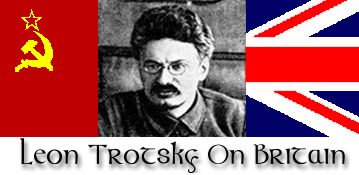

We are indebted to Allan Clinton, the ex-editor of Trotsky’s Writings On Britain produced in 1975 by the New Park Publications, who said that there would be no objection to this article on the web since the text of Where is Britain Going?, together with two short contemporary reviews by Brailsford and Bertrand Russell and Trotsky’s rather more lengthy replies, is derived from that edition. Without the little reviews themselves Trotsky’s replies cannot be seen in context. The earlier English text, which was published in 1925, is very bad and clumsy and this one is far better.
There are three sorts of notes here, first those by Trotsky (with one by Brailsford) in 1925, those added by Clinton in 1975 and occasional additions and alterations of mine. Where I have added any material I have put it in square brackets and added my initials. The tone of the notes reflects the politics of the WRP in 1975 rather than my own but I have left most of them as they are. I have taken the liberty of correcting what I thought were obvious “typos” in the text together with at least one correction, the substitution of “lyddite” (a kind of high explosive) for “lignite” where the meaning is plainly that.
Trotsky’s biting wit and sarcasm are still a joy to read even if, 74 years later, the situation he describes has so changed. Yet his remarks about growing American power were very percipient at a time when most British people still thought of Britain the THE great power even if the Admiralty had reluctantly accepted parity of fleets with the United States in the Washington Treaty. LDT, writing at a time when Germany was a military void, thought that the next imperialist clash would be between the two Anglo-Saxon powers in which of course he was mistaken. However imperialist conflicts are still with us and as we enter the new millennium there does appear to be growing friction between Europe and the United States.
Whether the monarchy still plays the same important role for reaction as it did then is less certain. My own feeling is that in a crisis Prince Charles and his old and ugly mistress would be more likely to provoke than pacify the proletariat. Certainly Rupert Murdoch does not consider the dysfunctional Windsor clan as a useful ally. In any case on a world scale the role and weight of this minor German princeling family has enormously diminished with the relative decline in British military and economic power.
Religion is a far less important social force here and in Europe generally than then Trotsky was writing but his message applies with redoubled force when we look at many other areas in the world. The illusions expressed by Brailsford can still be heard when popular social movements adhering to Islam take an apparently anti-imperialist or anti-capitalist direction.
But what would LDT have made of Blair, Jospin and Clinton today? Mincemeat certainly in a literary sense but alas we lack socialists and revolutionaries of his stature. Perhaps that is to look at it the wrong way round. We have not had great working class movements and victories, such as the Russian revolution, but rather defeats while, to say the least, capitalism seems not to have exhausted its productive potential. Great and victorious struggles will throw up great and enormously talented individuals. Let us hope that this Marxist archive will provide some intellectual nourishment for those in the future, who will, I doubt not, be on the forward edge of the proletarian battle line.
The TIA is indebted to Ted Crawford for his work in transcribing the hundreds of pages of Trotsky’s writings on the class struggle in Britain. This work, however, is only the beginning of Leon Trotsky’s writings on Britain. The table of contents for this work should be seen as a broad based subject index that will grow as more writings become available on-line for use on the TIA. These might include new translations of previously unknown articles or documents hidden away in secret archives in Russia or they might come from individual articles from the hundreds of communist journals that flourished in the 1920s and 30s. Our aim will be to make available ALL these documents to our readers.
One last note ... the documents included herein use both British and US spellings. The weight is toward the British spelling given that New Park published these writings in Britain but the US spelling is obvious in a few of the chapters. We hope this does not distract you from content of the documents.

Last updated on: 2.7.2007